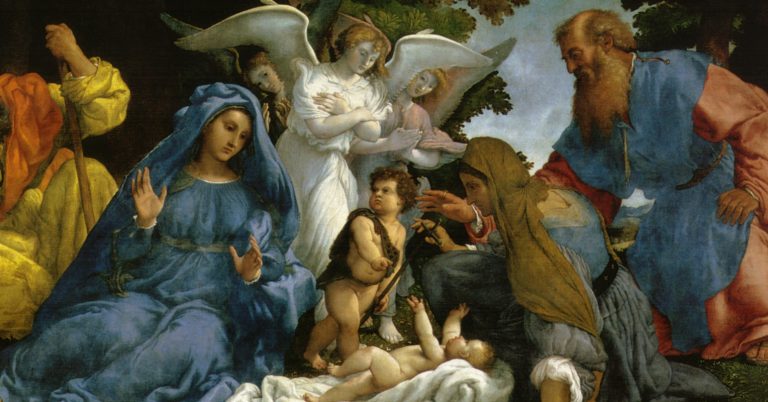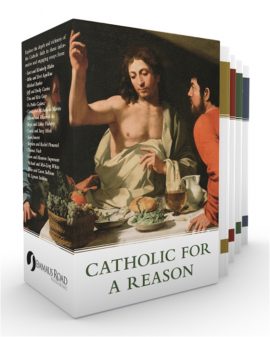By Curtis Martin
Curtis Martin is the founder and CEO of the Fellowship of Catholic University Students (FOCUS). He is a renowned speaker and author of numerous books. He also contributed to the Catholic for a Reason series, which features some of today's leading Catholic scholars.

Our Evangelical brothers and sisters have tapped into the depth of our hunger for love and happiness. When they ask, “Do you have a personal relationship with Jesus Christ?” it seems to touch a nerve. Often Catholics are put off by this question, and yet we need to realize that a personal relationship with Jesus Christ is every bit as much a Catholic issue as it is a Protestant issue, because it is profoundly a human issue. Every follower of Christ is called to a deep and personal relationship with our living Savior. Catholics frequently miss the boat when this question is asked. The typical response to the question is “Yes, I’m a Catholic.” This answer may show a lack of understanding for the question. It is as if someone asked, “Do you know the President of the United States?” and I replied, “Yes, I am an American.”
As Catholics, we are members of God’s family, but do we really know Him? We seem to have things backwards these days, as if membership in the Church were the fundamental issue. In reality, our membership in the Church is the primary result of our relationship with Jesus Christ.
But not only Catholics miss the point here. Our Evangelical brothers and sisters frequently miss the depth and intensity of the relationship Christ offers. We could ask, “Do you have a personal relationship with Jesus Christ?” and they might respond, “Yes, He is my Lord and Savior.” This is true as far as it goes, but the Gospel actually provides much more. As Christians we have been called to have a personal relationship with Jesus Christ, but we need to understand the nature of this relationship. I have a personal relationship with my next-door neighbor. His children are friends of my children, and his wife is a friend of my wife. But Christ is not calling us to be merely His friends.
I also have a personal relationship with my wife. This is very different. The relationship I have with my wife is so profound that she is not only my friend, but also part of my family. In fact, her family has become my family as well. And this is much more intense. Because of the covenant of marriage, I am called to an intimate relationship with people with whom I may have very little in common, except for our mutual love of my wife.
Just as my personal relationship with my wife has consequences, so too does our personal relationship with Christ. We see this in the Gospel, as Jesus not only reveals His Heavenly Father, but also invites us to accept God as Our Heavenly Father. He comes to us as our brother. In fact, the Hebrew word for redeemer, go-el, literally means “kinsman redeemer.” This is the heart of the Incarnation. The eternal Son of God becomes a son of Adam. Jesus’ favorite title for Himself is Son of man, literally ben adam (son of Adam). Jesus refers to Himself as Son of man more than any other title in Scripture, and yet no one else ever refers to him as Son of man. He wants us to understand that, in the flesh, He has become one with us so that He might be our kinsman and redeem us back into a deep personal and familial relationship with His Heavenly Father. In fact, an accurate summary of salvation history is that Our Heavenly Father is taking the wounded, fractured family of humanity and reconstituting it in Christ into the Family of God. Yes, as Catholic Christians we do have a personal relationship with Jesus Christ—He is our first-born brother, His Father is our Father, and His brothers and sisters become our brothers and sisters. And His mother is also our mother.
Because God’s plan of salvation brings us into His family, Mary’s role is significant to all of us. Just as the eternal Son of God has but one Father, and He has shared His Father with us, so too, through the Incarnation, God’s Son has been born of one woman and His mother becomes the mother of all Christians in the life of grace. As beloved disciples, we are called to live our life within the Family of God not only by receiving Jesus’ Father, but also by following the beloved disciple John’s example and taking His mother into our home. “Then he said to the disciple, ‘Behold, your mother!’ And from that hour the disciple took her to his own home” (John 19:27).
At times, Catholics and Eastern Orthodox Christians have been accused of making too much of Mary. This is a failure to understand history. The teachings about Mary have always been a simple reflection of the Incarnation of the eternal Son of God as her Son. In 431, the Church declared definitively that Mary was Theotokos, the God-bearer or Mother of God. This was not done primarily to honor Mary, but to clarify orthodox Christian teaching against those who were denying that Jesus Christ was truly God. By affirming the fact that Mary was the Mother of God, the Church affirmed that Jesus was truly God. So it is with all the teachings concerning Mary. Under the inspiration of the Holy Spirit, Mary herself teaches:
My soul magnifies the Lord, and my spirit rejoices in God my Savior, for he has regarded the low estate of his handmaiden. For behold, henceforth all generations will call me blessed. (Luke 1:46-48)
Mary is, by her nature, a lowly handmaid but, by the grace of God, her soul magnifies the Lord, and she has become the Mother of God and our mother too, if we live in Christ.
As Christians, the very spirit of Christ is alive within us. It is our responsibility within the Family of God to honor Our Heavenly Father and our spiritual mother. Mary’s role as mother and “the woman” is not insignificant to our salvation. As we have seen in preceding chapters, those who keep the commandments of God and bear witness to Jesus are children of Mary (Rev 12:17).
To live in Christ, we must love what He loves and hate what He hates. We know that the historical Jesus had a historical mother, Mary, and that He loved her. He honored His mother and He continues to honor and glorify her in us. Marian devotion is therefore not an option for the Christian, but an obligation in keeping with the Fourth Commandment. If we are to have God as Father in Christ, we must have Mary as mother. If we are to have a personal relationship with Christ, it must be within His family.
When we speak about the importance of being a member of the Church, it is not as if we need to join a club or organization to be saved. But we must realize that if we are going to allow God to save us, He is going to save us as a Father and call us into His family. Our devotion to the Blessed Virgin Mary flows from the “family Spirit” our salvation has given us. The Spirit of God has been given to us so that we might cry out, “Abba, Father!” (Rom 8:15).
You Might Also Like
 The Catholic for a Reason series presents the biblical foundation of Church teaching through the wisdom and experience of today’s best apologists and scholars. Essential matters of faith—God’s plan of salvation, the Church, the Blessed Virgin Mary, the Mass, the Sacrament of Matrimony, and Catholic identity—are examined through the lens of Scripture to provide fresh insight and understanding for today’s Catholics.
The Catholic for a Reason series presents the biblical foundation of Church teaching through the wisdom and experience of today’s best apologists and scholars. Essential matters of faith—God’s plan of salvation, the Church, the Blessed Virgin Mary, the Mass, the Sacrament of Matrimony, and Catholic identity—are examined through the lens of Scripture to provide fresh insight and understanding for today’s Catholics.